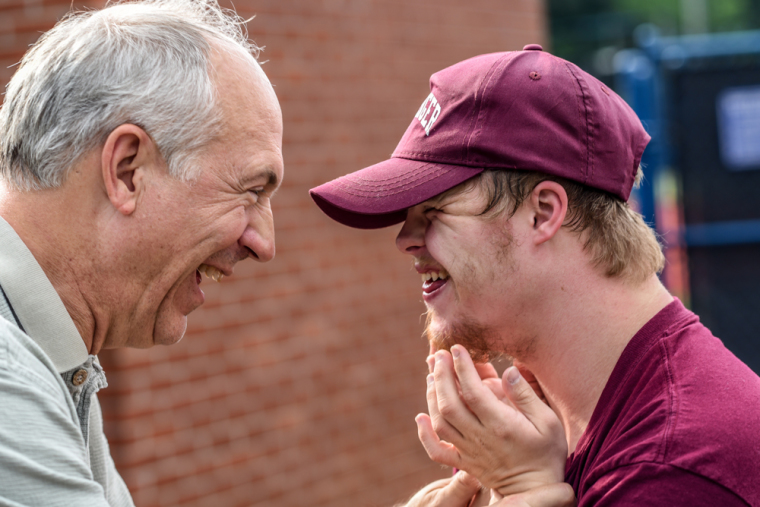
Are people with disabilities contributing members of society? Let's be realistic, depending on their disability, they might need life-long care and someone to provide for all of their needs. Depending on their intellectual disability, they might not be scientists, doctors, or teachers. Depending on their disability, they might not own businesses that will provide employment for the many people out of jobs.
Nonetheless, how wrong would it be if we assumed that this was true for all people with disabilities! There are individuals with different challenges—like autism, cerebral palsy, ADD and others—with an IQ higher than the rest of us average people. They are doing amazing things. They are doctors, teachers, scientists and great mathematicians.
Contributing members of society or a burden?
But what about those that do require life-long care? Are they contributing members of society? Or are they a burden? Popular opinion might say yes, that they are indeed a burden. This opinion is not surprising due to the fact that negative images devaluing persons with disabilities infiltrate today's literature, movies, news media and television. People with disabilities are portrayed, at best, as having lives no one wants and, at worst, as freaks or deviants. Rarely are they depicted as empowered people with much to contribute to the world around them.
In a society that measures success by performance or money in the bank, disabled people are often considered weak and inferior. A persons worth is judged according to the capacity to produce or the ability to achieve a certain professional status. When people say to their children, "You can be anything you want to be,"what they mean is that you can achieve worth through doing. Given this cultural attitude a person who is unable 'to do' is also seen be unable to contribute anything of worth to others.
Lessons from Jill
Recently, however, I have begun to look more closely at what it means to be a contributing member of society. Ireflected on the way thatJill, a young woman with Down syndrome, not only changed myself, but the rest of her family, her friends and the many people in her community. One thing about Jill that really stands out is her love and compassion for those around her. In her schooling years this was particularly evident when she would reach out to her struggling peers by holding their hands when they were upset.
This simple act of kindness was so powerful that everyone in the class began to do the same, all coming together and holding each other's hands to show support to a distressed classmate. Jill taught her classmates how to empathise with one another in a comforting and caring way and continues to teach and enrich the lives of those around her. Just because she does not fit a utilitarian standard that embraces some arbitrary level of intelligence or capacity for physical performance does not mean that her life is any less meaningful to those around her.
A crucially important part of Christ's body
The Bible says that Jesus' body, the church, has many parts but is ONE; therefore each member of Christ's body (each person) is essential for a healthy church, even those with disabilities.
"The body is a unit, though it is made up of many parts; and though all its parts are many, they form one body. So it is with Christ….those parts of the body that seem to be weaker are indispensible" (1 Corinthians chapter 12, verses 12, 22).
Although western culture might view people with disabilities as weak and a burden on society, they are actually a crucially important part of Christ's body and can be used by God for His glory, regardless of how flawed their physical and intellectual state may seem. Although they may take from society, with their need for constant care and support, they also give back so much. They offer unconditional love, the kind that has no strings attached.
It is pure, strong and real. They radiate joy as they treasure the simple things in life. They teach us compassion, acceptance and humility. They remind us to be thankful for the many blessings we have. They show us, in a profound way, what it really means to be whole. Those who cannot see the way our society is enriched by people with disabilities embrace a cheap view of a valuable life and employ a sliding scale of value that equates worth with functionality. They fail to see how these people are crucial members of our society and give back in so many ways, teaching us so many valuable lessons.
People with disabilities contribute to society
People with disabilities contribute to society by showing us what really matters in life, what it means to be human, what it means to be loved and accepted simply for being, not because of what we can or cannot do.
Personally, I think that in so many ways our western world is in moral crisis and that some of the values of the disability world could really help the greater world in sorting out this moral dilemma. They could help to look at what's really important and develop a whole new slate around what it means to be a valuable contributor in society.
First published February 5, 2014
Mercy Cornish (21) lives in Christchurch and studies at Canterbury University. Mercy has completed a Bachelor of Arts degree studying Media and Communications and Political Science. This year Mercy is undertaking honours in Media and Communications.
Mercy Cornish' previous articles may be viewed at www.pressserviceinternational.org/mercy-cornish.html